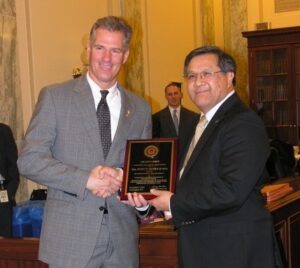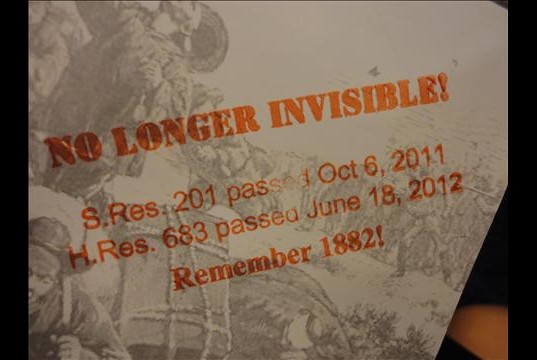It’s been 129 years since the Chinese Exclusion Act of 1882 was passed, but the Oct. 6 Senate resolution apologizing for it was welcomed nonetheless.
The resolution also apologizes for other anti-Chinese legislation enacted in the subsequent 60 years and puts the Senate on record as affirming for Chinese and other Asian immigrants the same civil rights afforded other nationalities.
“The enactment of Chinese Exclusionary laws is a shameful part of our history that must not be forgotten,” said the action’s sponsor, Sen. Diane Feinstein, D-Calif. “I hope this resolution will serve to enlighten those who may not be aware of this regrettable chapter in our history, and bring closure to the families whose loved ones lived through this difficult time.”
The Chinese Exclusion Act originally suspended all Chinese labor immigration to the U.S. for ten years and banned Chinese immigrants from becoming U.S. citizens, making Chinese the only national group to have ever been specifically singled out by Congress for discriminatory legislation in U.S. history. In the years succeeding the Act, the law was revisited by Congress and expanded to cover all Chinese immigrants for a longer period.
The 1882 Act was only one of a broader series of racist legislation, known as the Chinese Exclusion laws, enacted between 1870 and 1904.
Surprisingly, right-wing Sen. Scott Brown, R-Mass., was the chief Republican sponsor of the bill, saying, “[I]t is important that we acknowledge the wrongs that were committed many years ago.”
Obviously, given the unanimous vote, the resolution garnered widespread support. This is particularly evident in the sponsors, who range from liberal Sen. Feinstein to the far-right former tea-party darling Sen. Marco Rubio, R-Fla.
The Senate action bolstered a move by House lawmakers to enact a similar measure.
“The unanimous passage of this bill shows that there is strong, bipartisan support for acknowledging the terrible acts perpetrated by the American government against individuals of Chinese descent,” said Rep. Judy Chu, D-Calif., whose grandfather was a victim of the legislation.
Rep. Chu introduced a similar bill, also with bipartisan support, into the House.
The recent resolution is part of a tradition of animosity towards racist legislation. Even in the 1800s, many were opposed to the Chinese Exclusion laws. Congress originally passed something akin to the 1882 law in 1878, but it was vetoed by President Rutherford B. Hayes. It wasn’t until Chester Arthur assumed that office that the law could precede.
While the presidential vetoes were based on treaty obligations with China, Sen. George Frisbie Hoar, an old-style Massachusetts Republican, said at the time that the law amounted to “legalized racial discrimination.”
Much of the resentment towards Chinese Americans emanated from divisive labor practices used by big industrialists. They were both used as cheap labor and demonized as stealing jobs from white workers. The fledgling labor movement was divided. The Knights of Labor supported the anti-Chinese legislation, but the more left wing, militant Industrial Workers of the World was fervently opposed.
As the Senate resolution notes, “[T]he contributions of persons of Chinese descent in the agriculture, mining, manufacturing, construction, fishing, and canning industries were critical to establishing the foundations for economic growth in the Nation, particularly in the western United States.”
The period was marked not simply by exclusion of, but also violence against, Chinese workers, including, also from the resolution, “the 1887 Snake River Massacre in Oregon, at which 31 Chinese miners were killed; and … numerous other incidents, including attacks on Chinese immigrants in Rock Springs, San Francisco, Tacoma, and Los Angeles.”
The current Senate action didn’t take place in a vacuum; it was pushed forward by an organized movement, made up primarily of members of the Chinese and Asian- American communities, much of which was organized under the aegis of the 1882 Project. Members include the Chinese American Citizens Alliance, the Japanese American Citizens League and others. The American Jewish Committee, among others, has endorsed it.
According to the coalition, it was vitally important for the current Congress to pass the resolution, “before the last living generation subject to the Chinese Exclusion laws leave us.”





